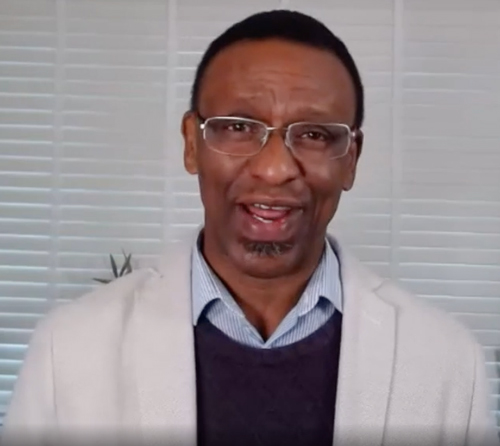
“You’ve got to do something about the injustice”
Justice issues have been an unexpected part of the year of our current Baptist Union president Yinka Oyekan. We invited him to speak about the actions and advocacy he has been involved with since the death of George Floyd, and what he has learnt about faith and justice in this time.
My presidency has come at a very fascinating time. After George Floyd died my eyes were opened to a number of issues I wasn’t aware of as a black person with a mixed race heritage (it might not be obvious, but I am actually mixed race.) I’m not politically motivated, and I had to very quickly become aware of the political issues.
Black people face racism at every level: the judiciary, police, workplace. For instance, in every police force in England and Wales, black people are more likely to be stopped and searched than any other racial group. Why? Simply because they’re black. The police are actually more likely to find drugs on white people than black people.
I think there are many things that cause injustices in society, and people are struggling with many things. But at this point in time I believe that racial injustice is something being highlighted by God, and we as Baptists should take notice of it. And not just take notice, we should do something in response to it. We should actively engage with it. Otherwise there will be another generation God will use to deal with this injustice.
What did I do about it? I did something I found incredibly difficult. I had a huge moral dilemma in lockdown. I organised a march outside Parliament.
A demonstration saying that black lives do actually matter. Of course, as a black minister, I’m not really interested in the political wing of the Black Lives Matter movement. But I am interested in the godly affirmation that black lives do actually matter.
It was a huge dilemma. Do I go out and possibly spread more coronavirus? How just can that be? Or, do I acknowledge that for centuries black people and people of colour’s lives and dreams have been oppressed, killed and shot; and it’s been going on for hundreds of years? Which is the greater evil? How should I respond?
In the end I felt there was a window in which God was doing something prophetic, and we needed to stand up and be counted as ministers with our kids - who were going out on the streets, protesting at the injustice and the way they’ve been treated, simply because of the pigmentation of their skin.
It put a huge strain on me personally, trying to learn more about the issues as well as answering my colleagues who were asking me about it. I was in the same boat as everyone else trying to understand what was going on. There are other people trying for years to highlight these issues. I thought it was a God moment, and God wanted me to highlight the problem.
If we look across our movement, I know CLT (the Core Leadership Team) are doing their best to face into what they can do about the systemic lack of black people in positions and offices across our movement. And this can’t be about tokenism: if you just promote people who don’t have the anointing or ability or gifting, it creates a bigger mess. But what should we be doing to encourage the black folk in our churches? Is there space for them in leadership? Can we train them and equip them? These are the kind of questions that are being asked across the Baptist movement. It’s a healthy reflection that’s going on, and I’ve got full confidence in the leadership team to get us there.
I’ve been learning that you can’t ignore it. You can’t turn a blind eye to injustice. You can’t defer it or leave it to somebody else. You’ve got to do something, at least in your context. You are responsible.
I’ve also learnt if we as a Baptist movement want to see a change, we have to find our prophetic voice. We can’t just go along with all the other denominations. We’ve got to speak up about what we believe, what we affirm, and what we want to see. There’s a place for unity, that’s true, but there’s also a place for a distinct Baptist voice. I believe we need to have the courage to have our own voice in all of these kinds of issues.
I’ve learnt there’s an awful lot of racism out there that I hadn’t realised existed in the church. I’ve lost a handful of friends, but I think the issue of justice is much greater than any personal loss or sacrifice.
I think the issue of justice is at the core and heart of who Christ is. Any follower of Jesus Christ will grapple with the issue of injustice in an honourable way, and will do their best to bring the love and alleviation of the suffering where and if they can.
Click here to download a pdf version of this article.
 Yinka Oyekan is the 2020-2021 President of the Baptist Union of Great Britain
Yinka Oyekan is the 2020-2021 President of the Baptist Union of Great Britain
This is a shortened transcript of a video interview Yinka contributed to this edition of Baptists Together magazine. In the interview Yinka talks about his understanding of justice, the relationship between justice and mission, and how his church – The Gate, Reading – has become involved in social action projects which address local injustices.